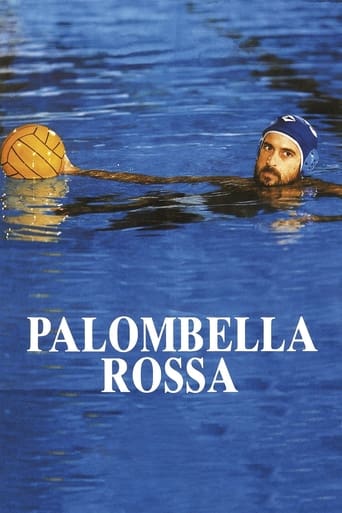

Why so much hype?
... View MoreIt’s sentimental, ridiculously long and only occasionally funny
... View MoreIt’s fine. It's literally the definition of a fine movie. You’ve seen it before, you know every beat and outcome before the characters even do. Only question is how much escapism you’re looking for.
... View MoreThe storyline feels a little thin and moth-eaten in parts but this sequel is plenty of fun.
... View MoreI consider Red Lob one of the best Italian movies of all times. It's surreal, moving, thought-provoking and incredibly funny. I wonder what a non-Italian audience may make of it, since it's steeped in references of the Italian political environment of the 70s/80s but I hope such audience can enjoy in the same way, I, for example, can love an Aki Kaurismaki movie despite it coming from a culture whose finer points I ignore.It's a film of my adolescence and nowadays it looks, feels and sounds quaint and almost naive -- but also courageous. Which Italian director would risk today to make a two-hours dream-like, heavily metaphorical political movie? And whose director would manage to make something so hilarious out of it?I wish I could share at length how much Red Lob influenced me and my whole generation. Some scenes, like the one where Michele slaps the journalist in the face because she is using clichéd expressions, or the one where he tries to explain to a Catholic politician why they are different, are still quoted today and are part of our cultural baggage. If you've never seen a Moretti movie, maybe start by something more conventional like The Mass is Ended but please don't pass by Red Lob, because it's a real treat.
... View More1989: Berlin wall is down. communist dictators in the past. for all the people that lived this age a new freedom, but for those who were in the west, it's the falling of hope. unless everybody knew that real socialism was a bad solution, it represented the chance to create, or just imagine, something different from capitalism. now the wall is down, what does it mean to be left-wing? if you've been a communist all of your life, what's your new position in society. Moretti here represents perfectly this situation: Italian communist party, is almost lost, a great discussion inside: what are we doing, where do we come from, and (most important) where do we go now? are we different, are we the same of the rest? can we find back the will to fight?
... View MoreThis film is deeply enmeshed in the political culture of Italy, and, in particular, in the culture and politics of that party once known as the Italian Communist Party (PCI). Although you don't need an understanding of this context to enjoy the film, your appreciation of it is certainly enhanced by knowing where Moretti is coming from.Throughout the film the protagonist, Michele, reiterates a phrase that captures a good deal of the identity of the PCI: `We're the same, but we're different.' The PCI claimed, on the one hand, that it was like any other party: it sought to arrive at power by winning a consensus at the polls and electing its candidates to public office--a party with just as much right as any other (`of equal constitutional dignity') to exercise power within a democratic state. On the other hand, the party said that it was different from all the others because it wanted to use state power in order to bring about a transformation of the existing social and economic order: to build a society in which the exploitativeness, irrationality, all-pervasive commercialism, environmental degradation, and social injustice characteristic of capitalism would be gradually overcome. The party was in the system, but not of the system. This, then, was a party that appealed to the dreams of many idealistic Italians to create a better world to live in (party membership fluctuated between 1.5 and 2 million--and the party saw its percentage of the vote rise in every election for 30 years, cresting in '76 at about 35%).But as the party got closer to being brought into the government, the tightrope act became more and more tortuous--hence, all of those very contorted "party lines" articulated by Michele in which he attempts to explain why the party should be brought into the government (and why there was nothing to fear from the party), while still holding on to the notion that the party stood for opposition to the existing social order. And that's why another constant refrain in the film is Michele's `I remember': he remembers not only things from his own past, but also a time when the party really seemed to stand for the traditional ideals of the Left.Now the PCI looks pretty much like any other party, and it no longer even calls itself a party, thus distancing itself from its Marxist-Leninist past: its name today is the unthreatening `Democrats of the Left.' And millions of progressive Italians feel adrift now that they have no party as the repository of their idealism--a sense of desperation expressed beautifully by Michele when he cries out, `Di qualcosa di sinistra' (`Just say something leftist').By the way, the English title given to the film (`The Red Wood Pigeon') makes absolutely no sense. `Palombella' refers to that shot in water polo we would call a `soft lob' and `rossa' =`red'. So a `palombella rossa' is a `red lob,' symbolizing the kind of soft landing that the PCI sought for its revolutionary program.
... View MoreI think Palombella Rossa is the best movie of Nanni Moretti (but I am afraid that non-italians people may not think the same, because there are several references to the situation of Italy, both in the 70's and at the time of the movie, that is 1989). I also think that it is easy to like Moretti (and his movies) very much or dislike him (and his movies) very much. It is much more difficult to stay in the middle. I personally find in this movie a wonderful mix of humour, fun and poetry. I also appreciate a lot the choice of music and songs and the images from Doctor Zivago (which is immortal, in my opinion). I think people who liked Moretti movies like April, Son's room and Dear Diary should see this one as well, and I hope they will enjoy it.
... View More